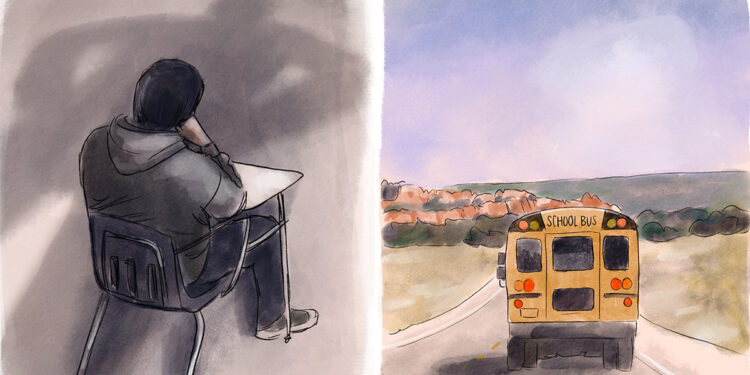This article was produced by New Mexico In Depth, which has twice been a member of ProPublica’s Local Reporting Network. Sign up for Dispatches to get stories like this one as soon as they are published.
A New Mexico school district that was disproportionately issuing harsh punishments to Indigenous students says it has dramatically reduced its long-term suspensions.
Two years ago, New Mexico In Depth and ProPublica reported that Indigenous children in New Mexico were facing higher rates of harsh school punishment, triggering a state Department of Justice civil rights inquiry into the discipline practices of the school district largely responsible for the disparity.
According to a January email from Gallup-McKinley County Schools Superintendent Mike Hyatt, the number of students kicked out of the district for 90 days or longer dropped from 21 children during the 2021-22 school year to six the following year and just one last year. Of those 28 long-term removals, 86%, or 24 cases, involved Native students.
But the state refused to provide New Mexico In Depth with complete, unredacted discipline data for the years in question, citing federal public records law governing educational records, making it impossible to independently verify those claims.
The district now appears to be more judicious in imposing long-term removals, reserving them for serious, potentially dangerous infractions.
As an example: From 2016-17 to 2019-20, before the changes, Gallup-McKinley reported that long-term removals were being used as punishment for disruptive behavior (“disorderly conduct”). But in all the cases Hyatt listed for 2021-22 to 2023-24, long-term removals were used only for more serious infractions, including repeated drug possession, drug distribution, assault, armed battery, theft and weapons possession, including firearms cases, he wrote.
In addition to the data, Hyatt said the district has made policy changes to better engage with students and prevent behavioral problems. It has replaced the district administrator in charge of student discipline, who has since retired, he said.
What We’re Watching
During Donald Trump’s second presidency, ProPublica will focus on the areas most in need of scrutiny. Here are some of the issues our reporters will be watching — and how to get in touch with them securely.
We’re trying something new. Was it helpful?
In 2022, the news organizations undertook a detailed analysis of statewide school discipline rates that showed Indigenous students disproportionately experience the harshest forms of punishment: exclusions from school for 90 days or more and referrals to law enforcement.
Using district discipline reports obtained from the state Public Education Department, the news organizations found that Gallup-McKinley, which boasts the largest Native student body in the nation, was the epicenter of a statewide trend toward Indigenous children being pushed out of classrooms at higher rates than other students between 2016 and 2020. At the time, the district’s superintendent called the findings “completely false,” but the district’s own data contradicted that claim.
New Mexico Attorney General Raúl Torrez, who heads the state’s Department of Justice and its new Civil Rights Division, initiated a review of the matter in late 2023. His investigators were also unable to obtain complete, unredacted data from the education department, according to emails between the agencies that New Mexico In Depth reviewed.
The state’s Department of Justice inquiry also faced delays as it tried to obtain student discipline data from Gallup-McKinley, emails show. In two, from Aug. 21, 2024, and Oct. 17, 2024, investigators took the school district to task for violating a statutory deadline in responding to their Inspection of Public Records Act requests.
Other emails in 2023 and 2024 reflected investigators’ frustration over repeated efforts to get meetings with state education officials who could provide more detailed data and answer questions.
In early June 2024, state Department of Justice Special Counsel Sean Sullivan urgently requested an in-person meeting with education department officials to discuss student discipline data. The meeting occurred June 20. But by July 1, Sullivan noted investigators still needed more detailed data. And in August, Sullivan repeatedly sought answers about missing data from the education department’s data manager.
State Department of Justice spokesperson Lauren Rodriguez told New Mexico In Depth in late January that the agency’s civil rights investigation is ongoing. Hyatt said he believed his office had fulfilled the department’s requests.
In a January email exchange with a reporter, Hyatt pushed back on New Mexico In Depth and ProPublica’s reporting, asserting discipline practices at Gallup-McKinley were not as harsh as the district’s past reports to the state suggested.
He said that after news headlines in 2022, an internal review identified extensive data entry errors in the district’s quarterly student discipline reports to the state. Specifically, he said punishments reported to the state as expulsions should instead have been logged as suspensions. (The district also changed its definition of expulsion in a way that would reduce the count of the harshest penalty: At the time of the newsrooms’ analyses, the district defined expulsions as removals of 90 days or longer; expulsion is now defined as permanent removals.)
But New Mexico In Depth and ProPublica found that student removals from school for 90 days or longer — regardless of what those removals are called — remained far higher for Gallup-McKinley than the rest of the state.
After meeting with Torrez about the state Department of Justice’s inquiry in September 2023, Hyatt contracted with a Kentucky-based financial consulting contractor, Unbridled Advisory. The contractor’s report showed that Native students’ discipline rates were modestly higher than other students, but not high enough in their view to be significant.
However, the company’s assessment did not include expulsions and did not conduct a specific analysis of the harshest forms of punishment, like the one carried out by the news organizations.







